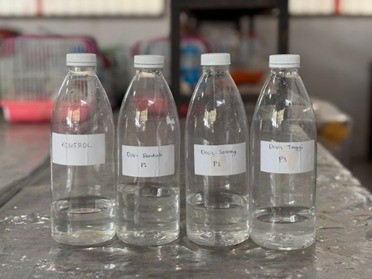The Department of Biology at FSM UNDIP, in collaboration with Universiti Sains Malaysia (USM), conducted a study titled “Assesing Microplastic Induced Health Risk Contributing to SDG3,” supported by WCU funding. The research team was led by Dr. Agung Janika Sitasiwi, M.Si., as the PIC (principal investigator), with members Rasyidah F. Ahmar, M.Si., and Rizky Sandhi Titisari, S.Si., M.Si.
Microplastics are plastic particles smaller than 5 mm that are toxic and potentially trigger biological effects in organisms. This study focused on polyethylene terephthalate (PET), a plastic commonly used in beverage bottles and packaging, which has been associated with increased oxidative stress and impaired organ function.

Using rats as test animals, the team administered oral PET microplastic exposure for 24 days. The findings showed disturbances in the digestive system, marked by inflammation of the intestinal lining that hindered nutrient absorption. These effects were linked to reduced body weight and lower visceral organ weights in the test animals.

Examination of liver (hepar) tissue revealed histological alterations accompanied by necrosis (cell death), reinforcing evidence that PET microplastic exposure can damage liver function. Structural damage was also observed in male reproductive organs, indicating a potential decline in fertility.
In addition to providing scientific evidence of the health impacts of PET microplastics, the study produced two intellectual property (IP) registrations. The results are expected to inform policy formulation that supports Sustainable Development Goal 3 (SDG 3), which aims to ensure healthy lives and promote well-being for all at all ages.
As an institution committed to impact-oriented research, FSM UNDIP fosters cross-disciplinary synergies and international collaboration, strengthens laboratory facilities, and advances downstream application and public utilization of research outcomes. This study underscores FSM UNDIP’s contribution to the World Class University (WCU) agenda and the SDGs, while reinforcing the faculty’s role in an evidence-based science and policy ecosystem.

